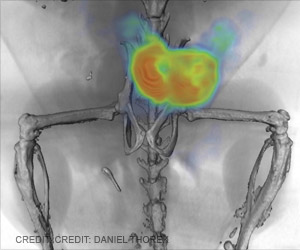Highlights
- A signaling circuit that is continuously activated without the need for a ligand in drug resistant prostate cancer patients has been identified by research team from Scripps Institute.
- The molecules in the signaling pathway can be targeted as potential therapy for people with drug resistant prostate cancer.
- This overcomes immunosuppression that would occur if NF-κB was targeted.
Finding a New Way to Treat Prostate Cancer
The method of treatment for prostate cancer is based on starving the cancer cells which involves depriving the cells of testosterone. Though this is found to be effective initially, most patients soon develop a resistance to this method of treatment. There are no other known methods of treatment for prostate cancer, therefore, the development of resistance to this therapy is catastrophic.Prostate Cancer
Prostate cancer is known to be the second most type of cancer among men but early detection and care will aid in treating the condition successfully. There are more than 2 million prostate cancer survivors in the U.S.Most prostate cancers are adenocarcinomas and they can grow and spread rapidly but most of them are very slow to grow. According to recent studies, the number of prostate cancer incidences is rising in India. It is a major health problem in the industrialized world. However, contrary to previous reports that prostate cancer incidence is low in India, recent studies have shown a sharp increase. This is due to large spread migration of the rural population to the cities with changing lifestyle, alterations in the dietary pattern, greater awareness about the disease, better medical facility and diagnosis.
The increasing numbers of prostate cancer warrant an alternate treatment method, which the current study could offer. Resistance to the current method of treatment is a major hindrance to care, resulting in poor prognosis. The study that focuses on understanding the mechanism behind the resistance and identifies key targets for drug therapy could provide a better model of care.
Composition of the Signaling Circuit
It is composed of the protein complex IκBα/NF-κB (p65) along with several other molecules. The signaling circuit controls the stem cell transcription factor expression which is responsible for the rapid growth of the cancer cells. These are proteins that are involved in the change from DNA to RNA.Other Potential Molecules in the Signaling Circuit
NF-kB are a group of closely related dimers that bind to the common site kB. These are transcription factors that are sequence specific and have long known to be involved in inflammatory response. The importance of these transcription factors in inflammation is undisputed but studies conducted recently on NF-kB as well as the signaling pathways are associated with its activation as well as in tumor genesis.Functions of NF-kB
- Anti-apoptotic property- NF-κB exhibits anti-apoptotic property that aid in protection against inflammation.
- They play a role in maintaining inflammatory response via leukocyte activation.
- NF-κB promotes apoptosis of leukocyte which in turn promotes the resolution of inflammation.
- NF-κB is associated with the feedback control of inflammation by a variety of means which contribute to the size and durations of the inflammatory response.
Dr. Luo who is the senior author of the current study found that the suppression of NF-kB in non-cancerous immune cells could be avoided by targeting other molecular components in the signaling pathway.
The Other molecular components in the signaling pathway include
- The microRNA miR-196b-3p- Promotes the development of tumor
- Meis2 – Essential mammalian developmental gene. Overexpression of this gene could disrupt the circuit.
- PPP3CC- It inhibits the activity of NF-kB in prostate cancer cells.
References:
- Ji-Hak Jeong, Sun-Jin Park, Shohreh Iravani Dickinson, Jun-Li Luo. A Constitutive Intrinsic Inflammatory Signaling Circuit Composed of miR-196b, Meis2, PPP3CC, and p65 Drives Prostate Cancer Castration Resistance.Molecular Cell,(2016)DOI: 10.1016/j.molcel.2016.11.034















